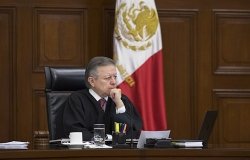Morocco: Women on Goverment Successes and Failures
One year has passed since the Justice and Development Party (PJD), a moderate Islamist party, won 107 of 395 parliamentary seats in Morocco’s first free election. The PJD won 27 percent of the seats and the right to lead a coalition government with three secular parties. Moroccan women were asked the following question: What are the successes and failures of the Justice and Development Party-led government?
One year has passed since the Justice and Development Party (PJD), a moderate Islamist party, won 107 of 395 parliamentary seats in Morocco’s first free election. The PJD won 27 percent of the seats and the right to lead a coalition government with three secular parties. Moroccan women were asked the following question: What are the successes and failures of the Islamist-led government?
Aziza Naciri, Parliamentary Staff Member
The country remains locked in a stagnant political situation. Even though the Justice and Development Party dominates parliament, Morocco has not changed at the legislative level. Parliamentary committees are not providing effective supervision of the government, which is their most important function. Some ministers are seemingly absent. The interior minister presides at meetings inside the prime minister’s office, even though the new constitution gives more power to the president. The structure of the government is inconsistent and ministers from the ruling coalition contradict each other.
Ouidade Melhaf, February 20 Movement Activist and Journalist
Article 19 of the June 2011 constitution makes men and women equal citizens under the law. It also created a government office to fight discrimination. But there is only one female minister in the PJD government. There are still many codes that need to be amended. For example, Article 475 of the penal code allows the rapist of a teenager to escape punishment if he marries her. The real problem is in the system of education, the media, and society. Women are considered second-class citizens.
Women have always been very active in all of our demonstrations since Feb. 20, 2011. The total equality between men and women was always present, not just in our slogans. Women participate in different committees of the movement from communications to strategy.
Malika Malek, Journalist
The PJD, unlike Islamist parties in Tunisia and Egypt, quickly integrated into multiparty politics and the democratic system. The party had already played an important role in the opposition led by the Socialist Party from 1998 to 2002. Today the PJD is in power but it rules in coalition with three drastically different parties. Istiqlal, or “Independence” is a conservative party. Koutla, or “Coalition” includes communists and socialists. The Popular Movement advocates for Berber rights and attention to rural areas. This divided coalition is not enacting policies or managing the government efficiently.
The PJD may be an Islamist party but it operates without a strong religious reference. King Mohamed VI is the highest religious authority. So there is an inherent separation between religion and politics. The new constitution is progressive in its protection of human rights and individual freedoms but Morocco still needs dignity, health, freedom and education for its citizens.
Jamila Khrichef, Tangier Councilwoman, Academy of Universal Global Peace Ambassador
It is quite premature to talk about failures and successes. Given the economic constraints and policies of previous governments, this coalition has little room to act. But this Islamist-led government differs from the previous one. It is introducing gradual reforms by increasing transparency and focusing on good governance.
This series provides a platform for women to engage in a free and fluid exchange about pivotal Middle East issues.
Related Program

The Islamists
Learn more about Hamas and how it relates to similarly aligned organizations throughout the region. Read more









